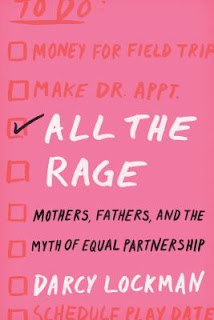All the Rage: Mothers, Fathers, and the Myth of Equal Partnership
Summary (from the publisher): Picking up where All Joy and No Fun left off, All the Rage sets out to understand why, in an age of so-called equality, full-time working mothers still carry.
The inequity of domestic life is one of the most profound and perplexing conundrums of our time. In an era of seemingly unprecedented feminist activism, enlightenment, and change, data show that one area of gender inequality stubbornly remains: the unequal amount of parental work that falls on women, no matter their class or professional status. All the Rage investigates the cause of this pervasive inequity to answer why, in households where both parents work full-time, mothers’ contributions—even those women who earn more than their partners—still outweigh fathers’ when it comes to raising children and maintaining a home.
How can this be? How, in a culture that has studied and lauded the benefits of fathers’ being active, present partners in child-rearing—benefits that extend far beyond the well-being of the kids themselves—can a commitment to fairness in marriage melt away upon the arrival of children?
Darcy Lockman drills deep to find answers, exploring how the feminist promise of true domestic partnership almost never, in fact, comes to pass. Starting with her own case-study as Ground Zero, she moves outward, chronicling the experiences of a diverse cross-section of women raising children with men; visiting new mothers’ groups and pioneering co-parenting specialists; and interviewing experts across academic fields, from gender studies professors and anthropologists to neuroscientists and primatologists. Lockman identifies three tenets that have upheld the cultural gender division of labor and peels back the reasons both men and women are culpable. Her findings are startling—and offer a catalyst for true change.
Review: I received an uncorrected proof of this book from HarperCollins.
This work of non-fiction explores the gender inequity that working mothers largely still face. Author Darcy Lockman begins by contemplating this frustrating reality in her own marriage and moving outward to include case studies from other partnerships as well as a whole host of data that explores the topic of domestic duties and how they are divided between mothers and fathers. Overwhelmingly, despite also working full-time jobs, working mothers bear the lion's share of the work of managing the home and taking care of chores and children.
Lockman outlines a familiar story of mothers as the managers of the home: fathers who only help with children or tasks if explicitly asked, fathers who enjoy far more leisure time than their spouses, mothers who carry the mental load of remembering the children's weekly schedule, coming up with ideas for and then executing meals, and every other detail that is required to keep the family's life running smoothly. The author illustrates that this is largely a cultural phenomenon, a holdover from when women largely did not work outside of the home. While men have increased the amount of time that they devote to childcare and housework, the divide is still very much present, due a whole host of factors that Lockman methodically details over the course of this book.
Although I recognized very clearly the dilemma described in the book and appreciated the author's thorough analysis, at times the book dragged and felt endlessly repetitive. The endless examples from frustrated women both illustrated the severity of the problem addressed by this book but also felt like I was reading the same woman's complaint on a loop. I could only imagine the reaction of one of the men accused of shirking their household duty would have if they read this; likely that the book is nagging and whiny just like the women who endlessly complain that they need more help. In other words, I think this book will only really resonate with the individuals who are in the current position of pulling the unequal share of work and those who aren't pulling their share still wouldn't seriously consider even reading the book, let alone making a change to how they approach work at home.
Stars: 3. 5



Comments
Post a Comment